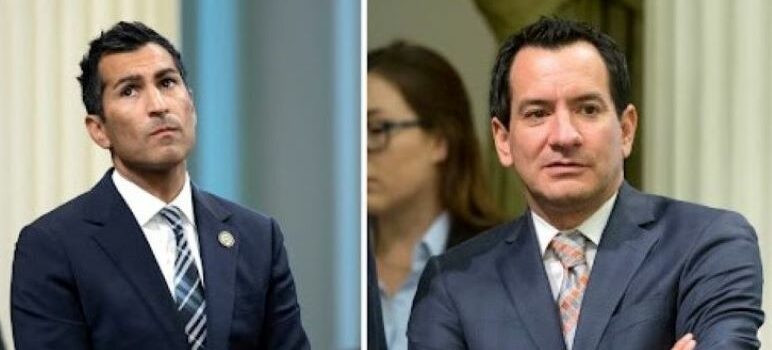After five months of backroom jockeying and another six-hour meeting behind closed doors, California Assembly Democrats agreed today to a lengthy transition that will see Robert Rivas succeed Assembly Speaker Anthony Rendon next summer.
Emerging from a ballroom at the Sacramento Convention Center, Rivas, a Hollister Democrat, said the Democratic caucus had unanimously voted to retain Rendon, a Lakewood Democrat, as speaker until the end of June, when Rivas is scheduled to finally assume the influential role overseeing the lower house of the Legislature.
“We have such a large caucus here in the state Assembly. Excited that we had the opportunity to walk out of there united,” Rivas said. “This was about unity. It was about bringing our caucus together, about planning for the future.”
Rivas originally challenged Rendon for the speakership, one of the most powerful positions at the state Capitol, in late May, but was blocked during a tense six-hour caucus meeting in which Rendon refused to step down and Rivas was unable to muster enough support to force him out.
Rendon has been speaker since the beginning of 2016, the longest reign since the 1990s, when California voters adopted term limits. He will term out in 2024.
The Assembly Democrats are now expected to vote on Dec. 5, the first day of the new legislative session, to formally adopt the transition plan. Because they hold a supermajority of seats in the chamber, they do not need Republican votes to elect a speaker.
Rivas, who was first elected in 2018, would become speaker on June 30 — at the conclusion of the state budget process and more than a year after Rivas first announced that he had enough support to take over as the Assembly leader.
Though he was flanked by dozens of colleagues, who rode down an escalator together cheering at the end of the meeting this evening, Rivas was notably not joined by Rendon, who did not appear publicly after the vote.
“I will continue working for the Californians who need it most, and keep putting power in the hands of my members, especially those who are underrepresented,” Rendon said in a statement. “I look forward to working with Assemblymember Rivas in anticipation of a smooth transition in 2023. Now, it is time to work together for California.”
The two faced off throughout the summer and fall in a battle of influence within the Assembly caucus, particularly among the candidates for an unusually large number of open seats this election.
Rivas took the extraordinary step of creating a political action committee, outside of the Democratic Party apparatus, that raised money from 19 of his Assembly colleagues and steered about $900,000 into more than a dozen races across the state. The committee, essentially a competitor to the traditional Assembly Democratic campaign account controlled by Rendon, exacerbated the strain with many of Rendon’s supporters.
But the caucus — which numbered 63 at the meeting Thursday, according to a spokesperson for Rendon, including some whose races remain too close to call two days after voting ended — aimed to project unity as a resolution to the drama finally emerged this evening.
Assemblymember Kevin McCarty, a Sacramento Democrat who was a top Rendon ally, stood beside an emotional Rivas as the speaker-designee recounted his rise from the son of farmworkers to the peak of California politics.
“Time heals wounds,” McCarty said. “We have a job to do.”
Assemblymember Jesse Gabriel, a Woodland Hills Democrat who supported Rivas, said many supported the compromise because they did not want the speakership fight to be a distraction in the new legislative session, which will take place in conjunction with a special session called by Gov. Gavin Newsom to consider a “windfall profits tax” on oil companies to help struggling Californians.
“We need to put our internal politics behind us and get to the policy work,” Gabriel said. “That was a heavy motivating factor for a lot of people.”
Alexei Koseff is a reporter with CalMatters. CalMatters reporter Ben Christopher contributed to this story.

